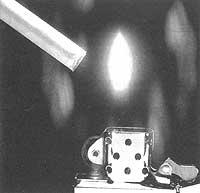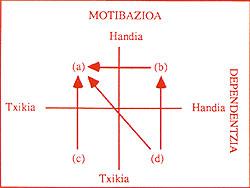Smoking (2) fight against tobacco
1988/06/01 Agirre, Jabier - Medikua eta OEEko kidea Iturria: Elhuyar aldizkaria
Economic interests, psychological conditions and social uses only hinder the health vision of the problem. Therefore, it would seem like a chimera to think that the problem can be solved with simple advice. However, we cannot forget the role that health professionals (doctors and nurses) and primary care professionals can play.
It is true that not everyone is approaching health centers. Not all people who are in danger of reaching that habit. However, we cannot forget that we are an example for the community and that our advice can be useful not only for patients, but also for friends and family.

The medical advice always has a double aspect: the person is directed to a certain receptor, but at the same time it impregnates the environment of that person, opening splashes among all. The medical advice (or nurse advice) is the simplest and cheapest of the procedures. Tobacco harms you and you have to quit smoking. A similar phrase is the medical advice. In a study carried out by RUSELL in 1979, it was observed that the councils and a small leaflet obtained in a year 5.1% of dismissal (results much higher than that of the control group).
However, another factor to take into account is that it is not the same to advise in a society sensitive to this issue that, on the contrary, act in another society in which the issue is taken with credibility (or worse still, disastrously) (and our case, unfortunately, continues to correspond to the second). Let's hope that quitting comes to our art like any other fashion.
The role of the professional in this struggle
And when I say professional, understand both the doctor and the nurse.
His ability to persuade regarding factors or characteristics of the professional (h.d. The ability to convince his listeners) is closely linked to his way of life, to let him smoke or not. If we are not able to recommend something (for example, to quit tobacco), the contradiction is evident. Only by what we say we do not educate people, but also by what we say. It is the collective or collective that in one way or another can have greater influence within a community of physicians (on smoking habit).
This point is accepted by all. According to all published reports, it is very difficult (almost impossible) to reduce the problem of smoking if there is no active participation of health professionals. Doctors, along with pharmacists and nurses, must fight tobacco in three ways: as a model or model, as a health educator, and as a public awareness or sensitizer of society.
A doctor who smokes, both inside and outside the health center, has a very negative impact on the fight against tobacco. This model of doctor is given more and more importance, but unfortunately in these professionals there are still more than 50% of smokers. This situation is very different in many industrialized countries like Britain. In these states, health professionals have stopped smoking massively in the last 20 years and since then have an important role in the fight against tobacco. We have, then, to learn from other peoples.

Gai honi buruzko eduki gehiago
Elhuyarrek garatutako teknologia





